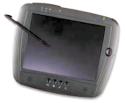Slate-style mobile tablet gains Linux support
Aug 30, 2004 — by LinuxDevices Staff — from the LinuxDevices Archive — 3 views Xybernaut is offering Linux-based implementations for one of its mobile computing devices. The Atigo T is based on a Transmeta Crusoe processor, and targets enterprises and facilities with mobile workers. Customer demand and Linux's flexibility inspired the Linux port, the company says.
Xybernaut is offering Linux-based implementations for one of its mobile computing devices. The Atigo T is based on a Transmeta Crusoe processor, and targets enterprises and facilities with mobile workers. Customer demand and Linux's flexibility inspired the Linux port, the company says.
(Click for slightly larger view of Atigo T)
The Atigo T is basically a slate-style tablet computer featuring a 8.4 x 6-inch, 600 x 800 pixel touchscreen LCD display (high brightness version available for outdoor applications). Additionally, the device can be used as a wearable computer featuring hands-free operation through voice activation, thanks to its built-in 16-bit audio system with stereo speakers and a headset jack.
The device is based on a Transmeta TM5800 processor, known for its sophisticated power management capabilities, an aspect that Xybernaut gave special consideration when implementing its Linux port, according to senior VP Dewayne Adams. “Most of our focus was spent on the base kernel and drivers, including suspend and resume,” notes Adams.
The Atigo T includes 256MB of SDRAM, and 128MB of internal Flash storage (configurations up to 1GB optionally available). Storage and networking expansion are available through standard Type II PC Card (Cardbus) and CompactFlash (CF-IO) slots. Other I/O ports include 2 USB 2.0 host ports and a headset jack.
The 1.8-pound unit measures 7.9 x 9.4 x 0.7 inches (200 x 240 x 18 mm). It is powered by an internal lithium-ion battery, and includes a desktop charging cradle with two additional USB ports. Optional accessories include a high-capacity battery pack, an optional hot-swappable clip-on battery, and a vehicle adapter.
Why Linux?
Previously, Xybernaut offered Windows XP Embedded on the Atigo T, but customer demand and Linux's greater flexibility prompted the company to undertake a Linux port, according to Marketing Spokesperson Michael Binko. “We can strip down the kernel, then build it up to do mobile computing. In a multimedia environment, Linux is really good. It's more flexible and customizable than XP embedded,” said Binko.
Multimedia capabilities are key to many wearable applications, Binko adds, citing an R&D project to create Atigo T-based wearable computers that assist Parkinson's Disease patients by offering interactive visual cues.
Binko says Linux demand was especially high in Europe, where Xybernaut supplies its platforms to more than 45 universities and research facilities working on wearable applications. Xybernaut also works with about 50 universities in the US, including land-grant universities, and is forging R&D alliances in the Pacific Rim as well, Binko says. Besides academic and enterprise customers, Xybernaut works with the US government on military/aerospace projects, according to Binko.
Another factor for Xybernaut's move to Linux was cost; Xybernaut can sell the Atigo T for less without Windows XP embedded, Binko notes.
Availability
Xybernaut's Linux 2.4 support is available now to Atigo T customers, who can optionally work with Xybernaut support staff on Linux implementations for specific uses. Xybernaut also offers Linux application development and training around the Atigo T platform. The platform is available in single quantities, but Xybernaut declined to specify a price.
Xybernaut also offers an XScale-based wearable platform that runs Windows CE, but the company has no plans at present to develop a Linux port for that device, Binko said.
This article was originally published on LinuxDevices.com and has been donated to the open source community by QuinStreet Inc. Please visit LinuxToday.com for up-to-date news and articles about Linux and open source.